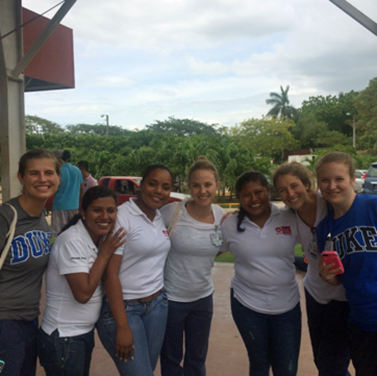While in Managua, Nicaragua six DUSON second semester ABSN students and their clinical instructor (Dr. Irene Felsman) have been placed with la Escuela de Enfermeria de la Universidad Politecnica de Nicaragua (UPOLI) (The School of Nursing in the Polytechnic University). We have been collaborating with three UPOLI nursing students and their professor Lic. Georgina Ramon on community health interventions with families in La Libertad, a low income barrio.
 It is amazing how close relationships can form in such a short period of time. From the very first day, we formed a great bond with the students that will last forever. We have also learned a lot about the students and their families, which gives us more insight into how families function in Nicaragua and the cultural differences from the U.S. Two of the three students have at least one parent who has passed away and the other student's mother is no longer involved in her family. The obstacles that these students overcome and the amount of work ethic that these students have are quite incredible. One of the students told us that she wakes up at 4 A.M. every day to pump water for her entire family to use for bathing and to use throughout the day. Another student gets up at 4 A.M. each day to take a bus because she lives about an hour and a half away from UPOLI's campus. They are at school Monday through Friday from 7 a.m. to 4 p.m.
It is amazing how close relationships can form in such a short period of time. From the very first day, we formed a great bond with the students that will last forever. We have also learned a lot about the students and their families, which gives us more insight into how families function in Nicaragua and the cultural differences from the U.S. Two of the three students have at least one parent who has passed away and the other student's mother is no longer involved in her family. The obstacles that these students overcome and the amount of work ethic that these students have are quite incredible. One of the students told us that she wakes up at 4 A.M. every day to pump water for her entire family to use for bathing and to use throughout the day. Another student gets up at 4 A.M. each day to take a bus because she lives about an hour and a half away from UPOLI's campus. They are at school Monday through Friday from 7 a.m. to 4 p.m.
On top of the responsibilities that they are expected to keep up at home for their families, they also have to find time to study. None of them have access to Internet at home, and they do not have computers; so in order to find information that they did not get in class or is not in their textbook, they have to utilize one of the seven computers that are available for the whole school of nursing. Needless to say, during my time in Nicaragua I have felt so grateful for the enormous amount of hospitality that has been shown to me and my colleagues and for the opportunity to study nursing in the United States with access to clean water and access to sufficient transportation and ample resources.
- Laura Beth Hamrick, ABSN student